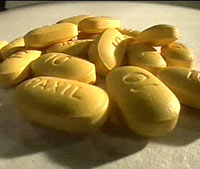
A neurotransmitter protein that plays a large if somewhat vague role in the depression equation is not affected by most antidepressant medications - and this might be why so many subjects don't see their conditions improve while taking popular drugs.
A new Canadian study began with the observation that the brains of many individuals who’ve supposedly recovered from depression still carry abnormally high amounts of a protein, known as monoamine oxidase a or MAO-A, which can absorb and disrupt the production of key chemicals like serotonin as it grows more concentrated in the brain. This interaction is usually a standard neurological process, but its can bring about dramatic changes in individuals with low serotonin levels. Modern antidepressants do not affect this protein, and most of the recovered subjects who still had high MAO-A readings relapsed before the study ended, especially if they'd stopped taking their meds.
New brain scanning technologies allowed the study’s authors to watch the interactions between these chemicals far more closely than ever before. Because serotonin is so crucial in determining mood (it’s often seen as the key factor in depression), researchers naturally assumed that MAO-A is also heavily involved in creating the side effects experienced by so many depressive subjects. The inability of popular antidepressants to reduce the overabundance of this protein may explain why many of the drugs don’t seem to work for an estimated 50% of the millions who struggle with severe depression.
It would appear that serotonin and MAO-A are more closely connected than we’d previously thought. Lead researchers noted that the most popular antidepressants raise serotonin levels but fail to reverse increasing levels of MAO-A, which literally digests and destroys several crucial mood-related chemicals known as monoamines (serotonin, dopamine, etc.). Antidepressants that targeted MAO-A were discontinued years ago due to adverse reactions in some subjects, but scientists developing the antidepressants of the future should certainly take this data to heart.
This report is significant in that it may help to reassure many subjects with drug-resistant depression that recurrent relapses are caused by the chemical properties of the drugs they’re taking rather than any personal failings. Every depression case is treatable to some degree, and subjects who’ve had no luck with past drug-based treatments may want to consider trying different meds or treatment plans the include regular personal or cognitive behavioral therapy sessions.